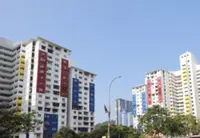KUALA LUMPUR: Last month, the Seremban City Council (MBS) has disclosed that it was saddled with RM2.03mil in rental arrears due to the failure of tenants at two People’s Housing Projects (PPR) to settle their monthly rent to the local authorities.
MBS City Mayor Datuk Masri Razali said residents of the two projects, Pangsapuri Rakyat Seri Perdana Paroi and Rumah Pangsa Kos Rendah Lobak, had amassed rental arrears of RM1.1mil and RM930,000 respectively.
He said most tenants argued that they could not afford to pay their monthly rent given that they are not regular income earners despite the rental rates being fixed at RM150 a month.
MBS also said that some tenants had been staying at their premises ‘for free’ for two decades at the PPR with arrears exceeding RM30,000.
Last year, Kuala Lumpur City Hall (DBKL) had reportedly said that it was in a similar predicament when it admitted incurring rental arrears totalling RM29.8mil due to the reluctance of PPR and Public Housing (PA) tenants under its jurisdiction to pay rent.
The arrears were owed to the local authorities by 21,000 tenants from a total of 40,000 dwellers at the PPR and PA.
In fact, the rent arrears issue is nothing new as it has been rearing its ugly head since the programme was launched in 2002, covering various locations in both urban areas and the outskirts.
BAD ATTITUDE
Simmy Chan, 35, who is a resident of a PPR unit in Seremban claimed that there are some PPR tenants who deliberately stayed for free without considering their responsibility to settle their monthly rent.
She said that as a result of the lack of firm action from the relevant authorities, these tenants felt that they are not obliged to pay their rent.
"Most residents of this PPR flat that I am staying now are from the younger generation who are able-bodied, but perhaps due to the lack of action from the authorities, they take advantage of the situation by not paying their rent.
"Some of them are no longer working. They use this as an excuse not to settle their dues and assume that this is not an offence as no action is taken against them,” she told Bernama.
Simmy who has been staying at the PPR for 10 years with her parents said, this refusal to pay rent can become like a virus, taking a toll on the local authorities and the government.
"Just imagine if one defers his or her rent payment from month to month, others would also be influenced to default as well; bad habits thrive. In the end, the unpaid rent accumulates, with arrears amounting to thousands of ringgit a month,” said Simmy, who is renting the PPR unit for only RM150 a month.
Professor Dr Ahmad Hariza Hashim from the Faculty of Human Ecology, Universiti Putra Malaysia (UPM) opined that PPR tenants are obliged to inform the relevant authority of their situation if they are having difficulties in paying their rent.
He said that it would not be appropriate for them to take a silent attitude and decide against paying their rent for too long a period while their monthly rental is rather low.
"Tenants should discuss with the relevant agency which can help them in the rental payment process if they do not have the financial resources or are not working due to health factors, etc.
"In this regard, the question arises as to why no action is taken by the relevant authorities when tenants are left without paying their rent for years. Perhaps efforts had been taken earlier but without follow-up action by the local authorities, hence the tenants tend to be bold enough not to pay their rent,” he said.
STERN ACTION
Elaborating on the issue, Ahmad Hariza said the authorities should take appropriate action towards tenants who default on their rent for housing that is provided by the government to prevent them from normalising their bad practices.
Some of the measures that can be taken include imposing an eviction order on tenants through the law and court proceedings, if they deliberately default on their rent.
This legal action should be clearly defined to serve as a reminder for errant tenants to settle their arrears.
"I feel that tenants should be reminded of their responsibility as the monthly rent can be utilised for maintenance and repairs of this flat. A solid source of finance will indirectly create a liveable housing environment,” he said.
DBKL is among the local authorities which have taken proactive and stern measures against errant tenants.
Among others, DBKL has introduced a Revenue Recovery Action Plan comprising various initiatives to ensure rent arrears are managed efficiently and effectively to deal with problem tenants.
These include having face-to-face sessions with tenants of units with rent arrears in addition to terminating their water supply.
"Resident associations in the area should also play an important role towards helping the local authority explain and educate tenants on the importance of paying their rent.
"As the PPR does not have a solid source of finance, losses will be incurred by the local authority and the government as they have to bear the costs of cleaning and maintenance especially when faced with lift breakdowns,” Ahmad Hariza added.
UPDATING DATA THROUGH PADU
Meanwhile, a lecturer from the Real Estate Division at College of Built Environment (CBE), UiTM, Nor Adibah Mohd Arif proposed that the Central Database System (Padu) be utilised to identify the profiles of tenants of government housing schemes.
She said that Padu can assist the local authority and the government in checking the background and the eligibility criteria of tenants in addition to conducting periodic assessment of their household income.
In this respect, she said if a tenant is unable to pay the rent due to financial problems, assistance can be channelled to the group in an accurate manner.
"Padu is a database which has a profile of citizens and permanent residents in Malaysia and as such, it would be easier for the relevant agency to assess the tenants’ data.
"This approach indirectly facilitates the process of providing assistance to the target groups by the government agencies.
She also said that the system also indirectly prevents non-eligible individuals from taking advantage of the benefits provided for low-income earners under the PPR as well as ensuring that the affordable homes are not monopolised by certain income groups.
"Through this system, screening can be done in a transparent manner with priority given to only those who are genuinely qualified to reside at the PPR.
"We don’t want people who reap benefits at the expense of other people’s difficulties. If a tenant is found to own an asset such as land or house, his or her application or tenancy agreement can be revoked,” she said.
HOLISTIC SOLUTION
Elaborating on the issue, Nor Adibah said closer collaboration and integration with all parties are needed to prevent the relevant agencies and the government from incurring millions of ringgit losses due to PPR tenants’ failure to settle their dues.
She said that if the problem persists, it will not only result in losses but also tarnish the image of the government’s affordable housing schemes.
"The Residential Tenancy Act which is expected to be tabled in Parliament this year is said to be among the best solutions to address the issue.
‘This is because this law will protect the rights of owners and tenants as well as provide opportunities for the local authority to conduct enforcement on the respective premises,” she added.
The Housing and Local Government Ministry (KPKT) was earlier reported to have said, the Bill, which is aimed at addressing rental property issues, will protect the interests as well as the rights of tenants and owners of residential housing units that are currently protected through the Contracts Act 1950 which is said to only contain incomprehensible sections and is too general in nature.
The act is expected to provide a more holistic protection to tenants and owners of the residential units - they would not have to go through lengthy and complex court procedures to solve their disputes.
The proposed tabling of the act was approved by the Cabinet on June 23, 2021. - Bernama





